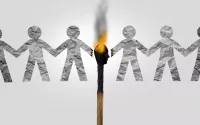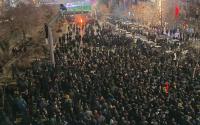29 April 2004Ira Chernus
Where is the U.S. peace movement, now that we really need it? The war in Iraq is handing the movement a golden opportunity on a silver platter. But the movement seems to be MIA. Too busy to organize the massive protests that should be happening today. Too busy trying to elect a presidential candidate who sounds a bit ashamed of his antiwar past.
Defeating Bush is certainly a high priority. But is it the only priority for the next half year? Should we drop everything else to work for a candidate who won't boast about opposing a terrible war? If John Kerry seems rather embarrassed by his long-ago peace activities, shouldn't we be embarrassed to put all our eggs in his basket?
The peace movement made this mistake once before, in 1984. Peace activists were riding a great wave of success called the Nuclear Freeze movement. For many, the time seemed right to keep on pressing toward total abolition of nuclear weapons. Then an election year arrived. Suddenly, nothing seemed more important than helping Walter Mondale defeat the incumbent right-winger, Ronald Reagan. So the antinuclear movement put itself on hold. It diverted all its energy and resources to supporting Mondale's campaign.
The results were mixed, at best. Reagan publicly supported nuclear arms control. In his second term he agreed to eliminate all intermediate-range nuclear-armed missiles in Europe. Perhaps he went further toward arms control than he would have otherwise, to blunt the political power of the antinuclear movement. Perhaps he would have followed the same policies in any event. Historians will always argue about that.
There is no arguing about two big facts, though. Despite the peace movement 's best efforts, Mondale was crushed on election day. And after 1984, the peace movement went into a decline that last nearly twenty years. It took another right-wing administration as bellicose as Reagan's to bring the movement back to life. On February 15, 2003, the movement became a global phenomenon, shouting a thunderous "NO" to the U.S. war machine and "YES" to peaceful resolution of conflict.
Now it's not clear how long that resurrection will last. A Bush victory in November could give us a repeat of 1984, taking the wind out of the peace movement's sails. Of course, a Bush victory is not at all certain. George W. is a far weaker candidate than Ronnie was twenty years ago. Kerry has every chance to win, especially if things continue to go wrong for the U.S. war in Iraq.
Iraq is Bush's great vulnerability. So peace activists should be thinking long and hard about how best to exploit it. Is it best to drop our normal antiwar activities and throw all our energy into voter registration and fund-raising for a centrist Democrat? Or should we do what we do best: Raise public awareness about the war, stir up opposition, and make the war politically difficult for the Bushies to pursue.
As Jonathan Schell recently pointed out, the Democrats are an antiwar party afraid to speak their name. Kerry is energized, but his energy is borrowed from peace activism. "Neither the movement nor Kerry can afford to let the antiwar energies that were and remain a principal source of their hopes and his die down," Schell wrote. "The movement must persist, independent of Kerry and keeping him or making him honest, yet not opposing him."
If we join the Kerry campaign and take our marching orders from Kerry strategists, we cannot persist. We will have to stay out of the streets. After all, Kerry disagrees with Bush only on details. His strategists don't want him associated with a bunch of "rag-tag youthful protesters and 60s-style radicals," as the mainstream press always puts it. That would remind the public of Kerry's own youthful protests, which is just what the Republicans want.
If we stay independent of Kerry, as Schell suggests, we may do more than just not oppose Kerry. We may give him the key to victory. Suppose we bring all those millions of outraged people back into the streets.
Here the president to remember is not Reagan, but Lyndon Baines Johnson. Johnson and his advisors knew that if he served a second term and continued the war in Vietnam, the antiwar movement would keep on growing. They knew that the resulting political split might well tear the nation apart.
So the antiwar movement forced Johnson to refuse to run for re-election in 1968. More importantly, the movement's highly visible activities convinced millions of Americans that Vietnam was already tearing America apart. The war just wasn't worth it, those millions concluded. The war became so unpopular, not only because American soldiers were dying, but because the hope for a unified nation was dying.
A vigorous, highly visible antiwar movement now might well have a similar effect. It might undermine support for Bush's war policy and Bush himself, by showing that he and his policies are tearing us apart. Then Kerry could distance himself from the protests yet ask, persuasively, "Can we stand four more years of this?"
A vigorous, highly visible peace movement might also affect U.S. policy in the short run. There are intense debates going on at the highest levels about how much military force to use in Iraq. Pictures of antiwar crowds out in the streets would put pressure on the White House to take the more moderate route, simply because it involves less political risk. If we care more about stopping the killing in Iraq than stopping Bush's re-election, we will split our energies between electoral politics and antiwar activism.
The problem is, I fear, that too many of us put defeating Bush ahead of saving lives in Iraq. The progressive peace community is so consumed by visceral and vitriolic Bush-hating, it may not be able to think clearly enough about its own best interest. Reagan was as hated just as much in 1984 as Bush is now. That hatred may have been a poison pill for the peace movement.
Hatred usually is poisonous. We should not let it poison our golden opportunity to help the public see the folly of war. We should not let it poison our own commitment to do the right thing. Today, the right thing is to climb up on the rooftops and shout, as loud as we can, "Stop this war, now!"
Ira Chernus is Professor of Religious Studies at the University of Colorado at Boulder [email protected]






